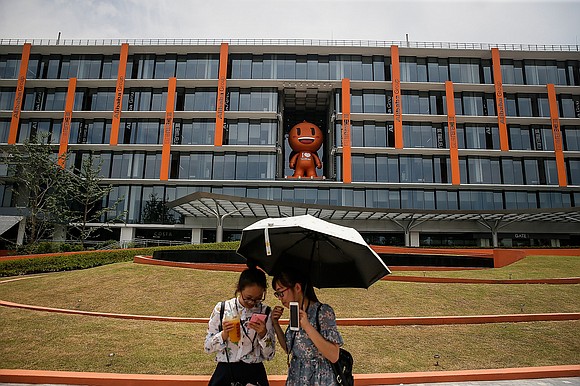Alibaba sales soar but US crackdown may be looming
CNN/Stylemagazine.com Newswire | 8/20/2020, 11:13 a.m.

By Paul R. La Monica, CNN Business
(CNN) -- China's economy has bounced back from the Covid-19 outbreak in China's Wuhan province. That's great news for Alibaba, the e-commerce and cloud giant. But the company also acknowledged the threat of being caught up in the burgeoning trade war between the United States and China.
Alibaba posted strong sales and earnings growth Thursday morning that topped Wall Street's forecasts. Overall revenue was up nearly 35% from a year ago and the company also posted solid increases in total and mobile users.
"It's easy to be blasé about Alibaba posting revenue growth of 34% in the pandemic. But it's important to remember that Alibaba sells goods each year to the value of the GDP of the Netherlands," said Martin Garner, chief operations officer of CCS Insight. "Growing an enormous operation at this pace is an amazing achievement."
Still, the stock fell about 2% Thursday. But it is up more than 20% so far in 2020.
"Although the global community continues to struggle with uncertainties surrounding the pandemic, we have seen encouraging signs of recovery in China due to effective management of the outbreak in vast majority of the country," said Alibaba chairman and CEO Daniel Zhang during a call with analysts.
But Alibaba is concerned it could become a target in the Trump administration's war on Chinese tech firms such as ByteDance-owned TikTok and Tencent's WeChat.
Zhang acknowledged during the conference call with analysts that Alibaba faces "uncertainties from not only the global pandemic, but also increasing tensions between US and China."
"We are closely monitoring the latest shift in US government policies towards Chinese companies, which is a very fluid situation," Zhang added. "We are assessing the situation and any potential impact carefully and thoroughly and will take necessary actions to comply with any new regulations.
Alibaba does not have a major retail presence in the United States. But a growing number of small businesses in America use Alibaba's cloud hosting services to set up their own digital commerce operations.
Alibaba competes with the likes of Amazon, Microsoft and Google owner Alphabet in the lucrative cloud market. Alibaba said its cloud revenue rose nearly 60% from a year ago.
Zhang touted its cloud prowess -- and how that helps American companies -- during the conference call.
"As the world's largest e-commerce platform, Alibaba's primary commercial focus in the US is to support American brands, retailers, small businesses and farmers to sell to consumers and trade partners in China as well as the other key markets around the world," Zhang said.
"We believe global trade will continue, and Alibaba's active pursuit of our mission to make it easy to do business anywhere are fully aligned with the interest of both China and the United States," he added.
Still, US Secretary of State Mike Pompeo said earlier this month that American businesses must be wary of "untrusted" Chinese technology. He said it was dangerous to have too much information about intellectual property stored on cloud networks run by Alibaba and other Chinese firms.
Zhang pointed out though that Alibaba has a big opportunity in the Chinese cloud market, which is still in its early stages and has the potential to grow more rapidly than cloud computing in the United States.
Alibaba rival JD.com reported a better-than-expected jump in quarterly sales of 35% from a year ago earlier this week. Another Chinese e-commerce site, group deals platform Pinduoduo, will report its latest results Friday morning.
"The e-commerce growth story with all emerging markets and China in particular has been strong for a long time," said Kevin Carter, founder of The Emerging Markets Internet & Ecommerce ETF, which owns shares of Alibaba. "The numbers we're seeing are great."



